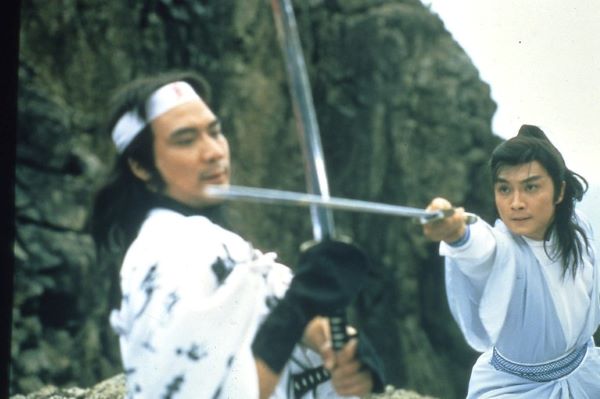The historical relationship between China and Japan has been rocky to say the least, culminating in the Japanese occupation of China from 1937 until 1945 and atomic devastation of Hiroshima and Nagasaki. For decades to come, the Japanese would be the go-to villains in Chinese cinema, rather like the English in American cinema. Or the Russians in American cinema. Or Middle Eastern people in American cinema. The vast field of martial arts would be an ideal canvas on which to explore this antipathy; compatible disciplines, but with different philosophies, training methods, and codes of honour. Ching Siu-Tung’s wildly entertaining wuxia deals with this long-standing rivalry with surprising depth inside a very simple framework.
Once every 10 years, the greatest swordsman from China faces off against best that Japan has to offer in a duel to the death, the honour of their homeland on each of the warriors’ shoulders. In the lead up to the event, Chinese champion Ching Wan (Damian Lau) and his Japanese counterpart Hashimoto (Norman Chu) come to respect each other, even forming the beginning of a grudging friendship. When they discover a plot to rig the contest they must decide whether to go ahead with the bout, knowing they have been manipulated by cynical forces on both sides, and that it will lead to the death of one of them.
Duel to the Death has a great reputation among fans of the subgenre and it’s easy to see why. It succeeds in being both a ground-breaking action romp with an editing style that would prove hugely influential, and a surprisingly thoughtful piece about the futility of conflict. Okay, it’s a conclusion reached after 80-odd minutes of giant ninjas that break down into smaller ninjas, talking decapitated heads, and ninjas flying into battle by kite, but it gets there in the end. Despite casting the decidedly not-Japanese Norman Chu as Hashimoto (although to be fair, Hollywood was still pulling the same stunt in 2005 with Ziyi Zhang, Michelle Yeoh, and Gong Li in Memoirs of a Geisha) and his stereotypical depiction as being rather stiff and obsessed with honour, it still casts him in a generally heroic light. Lau and Chu both easily provide the charisma necessary to add some grounded humanity at the centre of this fantastical tale.
But to be honest, noone comes to Duel to the Death as a meditation on Sino-Nipponese relations, or as a treatise on how brave men are shredded through the meat grinder of conflict. Right from the opening seconds the film delivers fast-paced, brutal, and choregraphed action. Even a propagandist puppet show enactment of the duel is hugely impressive. Ching manages to highlight the martial skills of his actors within the impossibly wide physical boundaries of the ‘wire-fu’ action, no mean feat prior to the advances in technology that would allow the dreamy, extended airborne fluidity of the likes of Crouching Tiger, Hidden Dragon and House of Flying Daggers (Ching would go on to provide fight choreography for Zhang Yimou on the latter). It also retains some of the charming hokiness in terms of the special effects that characterised the genre in the ’70s. Again though, for lovers of the genre this is as likely to be considered a blessing than a flaw.
Hugely influential and joyously ridiculous, Duel to the Death is crammed into the briskest of 86 minutes like a jack-in-the-box, coiled tight and ready to spring. Performed with perhaps more gravitas than its bonkers action deserves. It is hugely over-the-top but at the same time incredibly well made and deftly directed by a hungry young filmmaker who had already earned his stripes as assistant on numerous productions for nearly a decade prior.
Available on Blu-ray from Mon 20 Sep 2021
